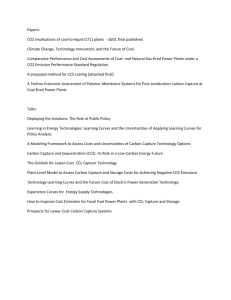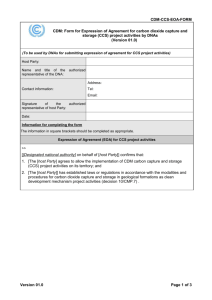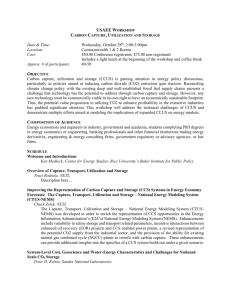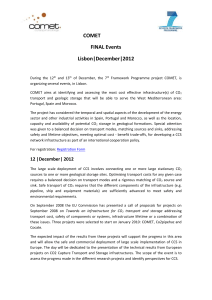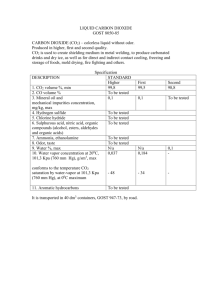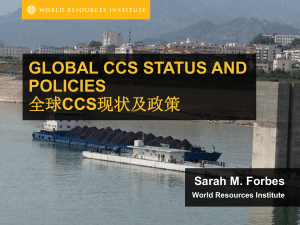IEAGHG Brief – Current and Ongoing Activities
advertisement
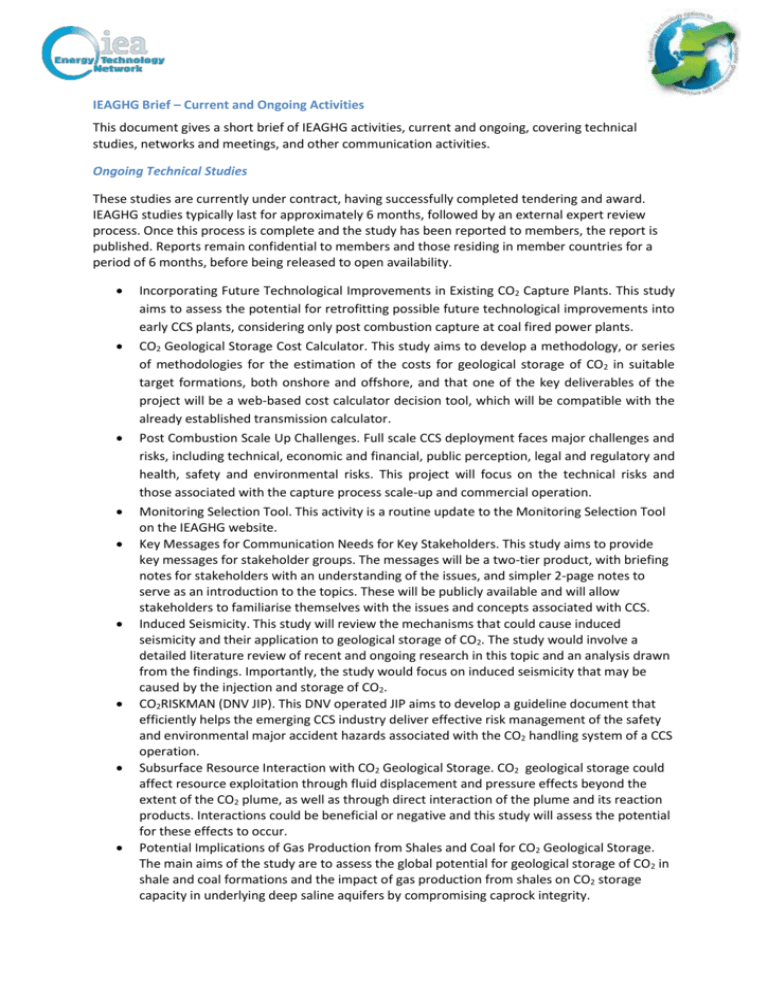
IEAGHG Brief – Current and Ongoing Activities This document gives a short brief of IEAGHG activities, current and ongoing, covering technical studies, networks and meetings, and other communication activities. Ongoing Technical Studies These studies are currently under contract, having successfully completed tendering and award. IEAGHG studies typically last for approximately 6 months, followed by an external expert review process. Once this process is complete and the study has been reported to members, the report is published. Reports remain confidential to members and those residing in member countries for a period of 6 months, before being released to open availability. Incorporating Future Technological Improvements in Existing CO2 Capture Plants. This study aims to assess the potential for retrofitting possible future technological improvements into early CCS plants, considering only post combustion capture at coal fired power plants. CO2 Geological Storage Cost Calculator. This study aims to develop a methodology, or series of methodologies for the estimation of the costs for geological storage of CO2 in suitable target formations, both onshore and offshore, and that one of the key deliverables of the project will be a web-based cost calculator decision tool, which will be compatible with the already established transmission calculator. Post Combustion Scale Up Challenges. Full scale CCS deployment faces major challenges and risks, including technical, economic and financial, public perception, legal and regulatory and health, safety and environmental risks. This project will focus on the technical risks and those associated with the capture process scale-up and commercial operation. Monitoring Selection Tool. This activity is a routine update to the Monitoring Selection Tool on the IEAGHG website. Key Messages for Communication Needs for Key Stakeholders. This study aims to provide key messages for stakeholder groups. The messages will be a two-tier product, with briefing notes for stakeholders with an understanding of the issues, and simpler 2-page notes to serve as an introduction to the topics. These will be publicly available and will allow stakeholders to familiarise themselves with the issues and concepts associated with CCS. Induced Seismicity. This study will review the mechanisms that could cause induced seismicity and their application to geological storage of CO2. The study would involve a detailed literature review of recent and ongoing research in this topic and an analysis drawn from the findings. Importantly, the study would focus on induced seismicity that may be caused by the injection and storage of CO2. CO2RISKMAN (DNV JIP). This DNV operated JIP aims to develop a guideline document that efficiently helps the emerging CCS industry deliver effective risk management of the safety and environmental major accident hazards associated with the CO2 handling system of a CCS operation. Subsurface Resource Interaction with CO2 Geological Storage. CO2 geological storage could affect resource exploitation through fluid displacement and pressure effects beyond the extent of the CO2 plume, as well as through direct interaction of the plume and its reaction products. Interactions could be beneficial or negative and this study will assess the potential for these effects to occur. Potential Implications of Gas Production from Shales and Coal for CO2 Geological Storage. The main aims of the study are to assess the global potential for geological storage of CO2 in shale and coal formations and the impact of gas production from shales on CO2 storage capacity in underlying deep saline aquifers by compromising caprock integrity. CO2 Dehydration. Within the full CCS chain the dehydration step is a relatively minor part and has been treated as a black box process in the past, paying little attention to the details of its design. However, the conventional drying technologies face a number of challenges, which need to be addressed before full scale deployment. IEAGHG has commissioned this study to examine the characteristics of the various drying processes and the way they can be best integrated into the CCS system. Methodologies and Technologies for Mitigation of Undesired CO2 Migration in the Subsurface. This study aims to develop a report built on the on the previous IEAGHG report on methods of leakage mitigation (2007/11). The study will focus on current mitigation and remediation methods that may be applied or considered in site specific conditions in the event of unpredicted CO2 migration. Studies at or nearing Reporting Stage These studies are either at the draft report stage, or are currently out to expert review and will be reported to members at the next Executive Committee meeting. Barriers to Implementation of CCS – Capacity Constraints. The aim of this study is to build upon the IEACCC report by looking the additional equipment, services and skills requirements for large scale CCS deployment in the power sector. If additional constraints are likely for CCS there may be an impact on the future deployment rates of CCS. Financial Mechanisms for Long-Term CO2 Liability. This study reviews existing and emerging CCS specific regulations, in different regions of the world and under different legal frameworks, concentrating on long-term liability aspects, and existing/amended non-CCS specific regulations relevant to the long-term liability of CO2 storage. Ethical Attitudes and Underground CO2 Storage. The core aim of this study is to chart the value systems and ethical attitudes of the people and institutions that come into play when they have to make a judgement concerning the underground storage of CO2. It is to be expected that within a given population one will see a number of different ethical profiles. It will aim to provide a better understanding of the moral values and norms of the perceiver. Abstraction of Formation Waters During CO2 Storage. The main aim of the study is to assess the global potential for abstraction of formation waters as part of DSF storage projects. The study includes a comprehensive literature review, from published research and industrial analogues (e.g. brine disposal from petroleum and coal bed methane industries) to provide guidance to potential project operators. CO2 Capture at Gas Fired Power Plants. This study will assess the performance, emissions, costs and operability of the leading CO2 capture options for natural gas fired combined cycle power plants. Meetings / International Research Networks in Planning IEAGHG operate a number of successful international research networks as well as numerous workshops on a variety of topics. IEAGHG are also the custodians of the biannual GHGT conference series. All our international research networks are open for all to register and can be found on our website (see below). 2nd Joint Network Meeting. For the second time, we are bringing together all of our geological storage based international research networks to assess their relative links, identify synergies and opportunities for collaboration and input. The Joint Network Meeting was held in New York in 2008, and lead to the formation of the Modelling network. Note that this meeting is open only to those who have attended previous network meetings. Environmental Impacts Workshop. The Environmental Impacts of CO2 Storage Workshop Series aims to stimulate and nurture global collaboration and knowledge advancement in potential impacts of CO2 Storage for Environmental Impact Assessments. 6th International CCS Summer School. The IEAGHG International CCS Summer School series has been running since 2007, and aims to provide a technical platform on which post graduates can launch a career in CCS. It covers an introduction to all aspects of CCS, with expert speakers invited from all around the globe. Chemical Looping Network. This network was established to promote further development and scale-up of processes for CO2 capture which involve solid looping cycles operating at elevated temperatures. GHGT-11. The 11th event in the highly successful GHGT series returns to Kyoto, Japan. The event is the highlight of the CCS calendar, and draws together up to 1500 international experts in all fields of CCS, and provides insight into the latest technological advances, as well as facilitating networking between researchers from around the world. The GHGT website (www.ghgt.info) has details of the registration process, and will shortly list the papers that will be presented at the conference. Registration is open, and the early bird discount runs until the 23rd of July 2012. Other Communications / Publication Activities Communication and information dissemination play a large part in the work of IEAGHG, and the following list is a brief highlight of current work. Blog development, both for IEAGHG and GHGT. These can be found through our website. Provision of public summary information on a range of CCS aspects, as part of the ‘Key Messages’ study currently underway. Technical Overview Book 2011. A compendium of the overviews to all IEAGHG studies published in 2011. Annual Review 2011. A concise summary of the work programme of IEAGHG and key achievements throughout 2011. Technical Reports CD 2011. All the 2011 technical studies and reviews referenced on a CD. Contacts and Further Information For further information on IEAGHG and our activities, please visit our website at www.ieaghg.org or for more information on the GHGT conference series, visit www.ghgt.info . Alternatively, we can be contacted on the details below: t: +44 1242 680753 f: +44 1242 680758 e: mail@ieaghg.org
